Entrepreneurship Report: Ventures, Skills, Economic Impact, Brexit
VerifiedAdded on 2020/02/17
|19
|6479
|95
Report
AI Summary
This report provides a comprehensive analysis of entrepreneurship, focusing on different categories of entrepreneurial ventures such as small business ventures, lifestyle businesses, large businesses, scalable start-up ventures, and social ventures, along with their relationship to various typologies of entrepreneurs including determined, accomplished, research and serial entrepreneurs. The report examines the scope, development, and growth of these ventures, particularly in the context of the UK economy and the impact of Brexit on small and medium-sized enterprises (SMEs). It further assesses the economic contributions of small businesses and business start-ups, and delves into the skills, characteristics, and motivational drivers of successful entrepreneurs. The analysis also explores how background and experience can hinder entrepreneurship, and concludes with a discussion on the key roles of entrepreneurs and the challenges they face.

ENTREPRENEURSHIP
Paraphrase This Document
Need a fresh take? Get an instant paraphrase of this document with our AI Paraphraser
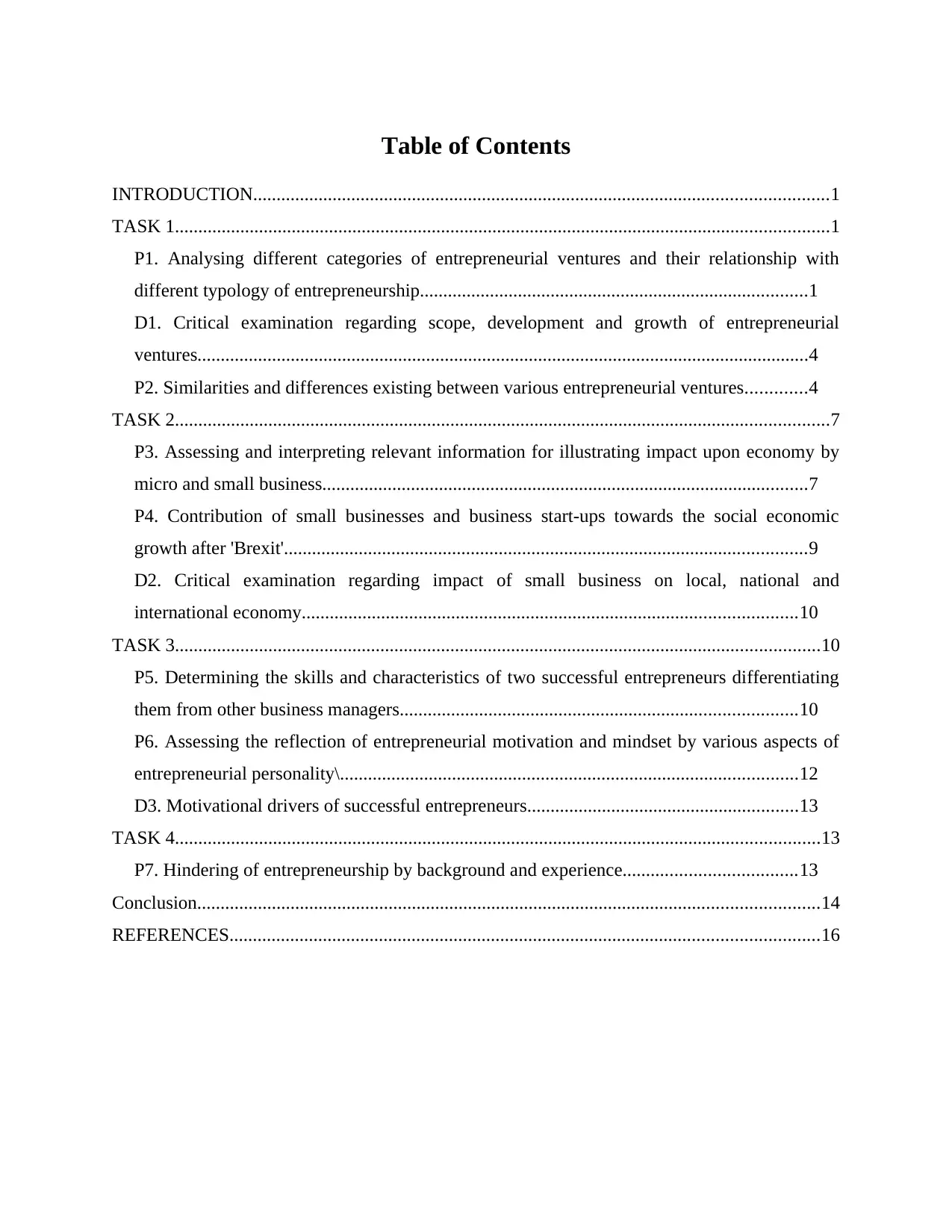
Table of Contents
INTRODUCTION...........................................................................................................................1
TASK 1............................................................................................................................................1
P1. Analysing different categories of entrepreneurial ventures and their relationship with
different typology of entrepreneurship...................................................................................1
D1. Critical examination regarding scope, development and growth of entrepreneurial
ventures...................................................................................................................................4
P2. Similarities and differences existing between various entrepreneurial ventures.............4
TASK 2............................................................................................................................................7
P3. Assessing and interpreting relevant information for illustrating impact upon economy by
micro and small business........................................................................................................7
P4. Contribution of small businesses and business start-ups towards the social economic
growth after 'Brexit'................................................................................................................9
D2. Critical examination regarding impact of small business on local, national and
international economy..........................................................................................................10
TASK 3..........................................................................................................................................10
P5. Determining the skills and characteristics of two successful entrepreneurs differentiating
them from other business managers.....................................................................................10
P6. Assessing the reflection of entrepreneurial motivation and mindset by various aspects of
entrepreneurial personality\..................................................................................................12
D3. Motivational drivers of successful entrepreneurs..........................................................13
TASK 4..........................................................................................................................................13
P7. Hindering of entrepreneurship by background and experience.....................................13
Conclusion.....................................................................................................................................14
REFERENCES..............................................................................................................................16
INTRODUCTION...........................................................................................................................1
TASK 1............................................................................................................................................1
P1. Analysing different categories of entrepreneurial ventures and their relationship with
different typology of entrepreneurship...................................................................................1
D1. Critical examination regarding scope, development and growth of entrepreneurial
ventures...................................................................................................................................4
P2. Similarities and differences existing between various entrepreneurial ventures.............4
TASK 2............................................................................................................................................7
P3. Assessing and interpreting relevant information for illustrating impact upon economy by
micro and small business........................................................................................................7
P4. Contribution of small businesses and business start-ups towards the social economic
growth after 'Brexit'................................................................................................................9
D2. Critical examination regarding impact of small business on local, national and
international economy..........................................................................................................10
TASK 3..........................................................................................................................................10
P5. Determining the skills and characteristics of two successful entrepreneurs differentiating
them from other business managers.....................................................................................10
P6. Assessing the reflection of entrepreneurial motivation and mindset by various aspects of
entrepreneurial personality\..................................................................................................12
D3. Motivational drivers of successful entrepreneurs..........................................................13
TASK 4..........................................................................................................................................13
P7. Hindering of entrepreneurship by background and experience.....................................13
Conclusion.....................................................................................................................................14
REFERENCES..............................................................................................................................16
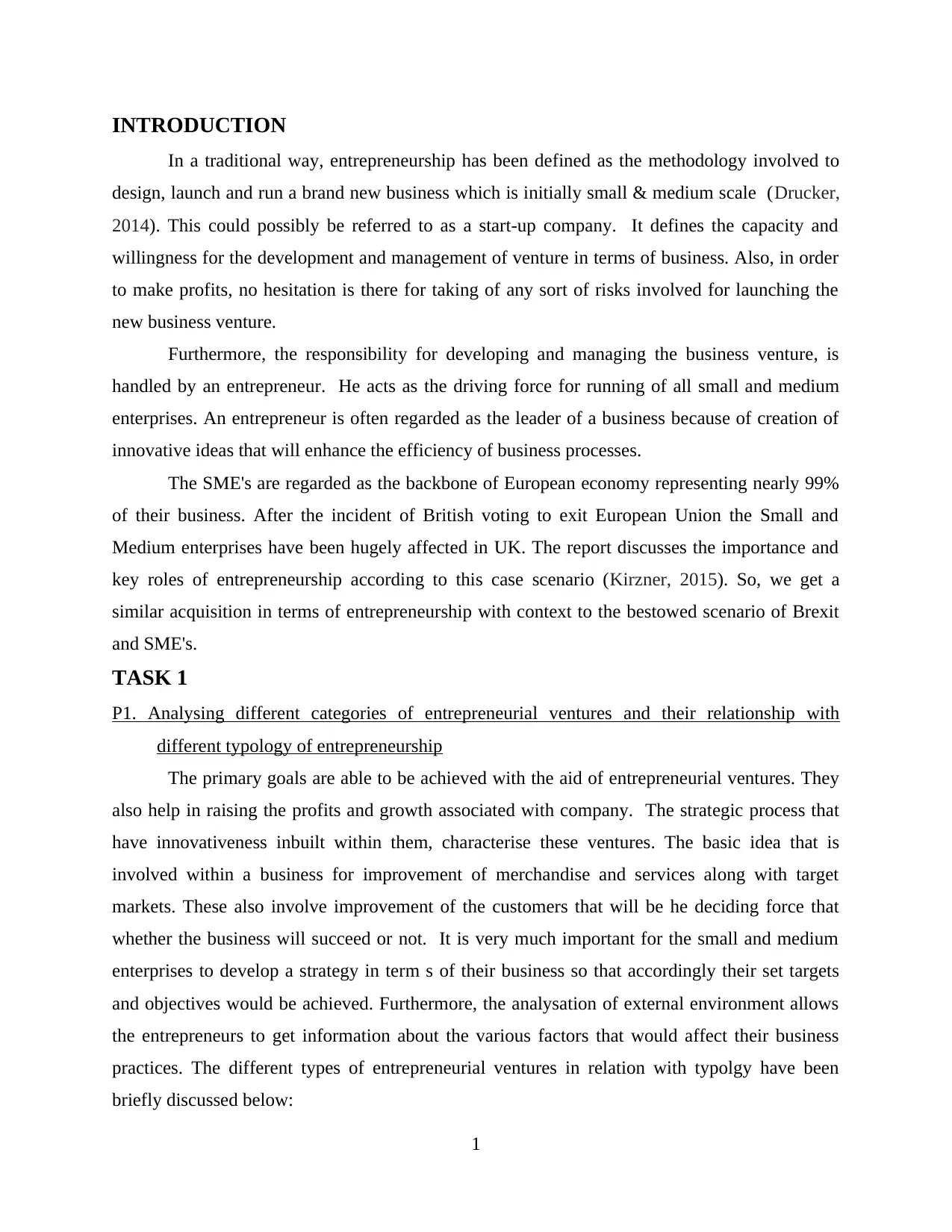
INTRODUCTION
In a traditional way, entrepreneurship has been defined as the methodology involved to
design, launch and run a brand new business which is initially small & medium scale (Drucker,
2014). This could possibly be referred to as a start-up company. It defines the capacity and
willingness for the development and management of venture in terms of business. Also, in order
to make profits, no hesitation is there for taking of any sort of risks involved for launching the
new business venture.
Furthermore, the responsibility for developing and managing the business venture, is
handled by an entrepreneur. He acts as the driving force for running of all small and medium
enterprises. An entrepreneur is often regarded as the leader of a business because of creation of
innovative ideas that will enhance the efficiency of business processes.
The SME's are regarded as the backbone of European economy representing nearly 99%
of their business. After the incident of British voting to exit European Union the Small and
Medium enterprises have been hugely affected in UK. The report discusses the importance and
key roles of entrepreneurship according to this case scenario (Kirzner, 2015). So, we get a
similar acquisition in terms of entrepreneurship with context to the bestowed scenario of Brexit
and SME's.
TASK 1
P1. Analysing different categories of entrepreneurial ventures and their relationship with
different typology of entrepreneurship
The primary goals are able to be achieved with the aid of entrepreneurial ventures. They
also help in raising the profits and growth associated with company. The strategic process that
have innovativeness inbuilt within them, characterise these ventures. The basic idea that is
involved within a business for improvement of merchandise and services along with target
markets. These also involve improvement of the customers that will be he deciding force that
whether the business will succeed or not. It is very much important for the small and medium
enterprises to develop a strategy in term s of their business so that accordingly their set targets
and objectives would be achieved. Furthermore, the analysation of external environment allows
the entrepreneurs to get information about the various factors that would affect their business
practices. The different types of entrepreneurial ventures in relation with typolgy have been
briefly discussed below:
1
In a traditional way, entrepreneurship has been defined as the methodology involved to
design, launch and run a brand new business which is initially small & medium scale (Drucker,
2014). This could possibly be referred to as a start-up company. It defines the capacity and
willingness for the development and management of venture in terms of business. Also, in order
to make profits, no hesitation is there for taking of any sort of risks involved for launching the
new business venture.
Furthermore, the responsibility for developing and managing the business venture, is
handled by an entrepreneur. He acts as the driving force for running of all small and medium
enterprises. An entrepreneur is often regarded as the leader of a business because of creation of
innovative ideas that will enhance the efficiency of business processes.
The SME's are regarded as the backbone of European economy representing nearly 99%
of their business. After the incident of British voting to exit European Union the Small and
Medium enterprises have been hugely affected in UK. The report discusses the importance and
key roles of entrepreneurship according to this case scenario (Kirzner, 2015). So, we get a
similar acquisition in terms of entrepreneurship with context to the bestowed scenario of Brexit
and SME's.
TASK 1
P1. Analysing different categories of entrepreneurial ventures and their relationship with
different typology of entrepreneurship
The primary goals are able to be achieved with the aid of entrepreneurial ventures. They
also help in raising the profits and growth associated with company. The strategic process that
have innovativeness inbuilt within them, characterise these ventures. The basic idea that is
involved within a business for improvement of merchandise and services along with target
markets. These also involve improvement of the customers that will be he deciding force that
whether the business will succeed or not. It is very much important for the small and medium
enterprises to develop a strategy in term s of their business so that accordingly their set targets
and objectives would be achieved. Furthermore, the analysation of external environment allows
the entrepreneurs to get information about the various factors that would affect their business
practices. The different types of entrepreneurial ventures in relation with typolgy have been
briefly discussed below:
1
⊘ This is a preview!⊘
Do you want full access?
Subscribe today to unlock all pages.

Trusted by 1+ million students worldwide
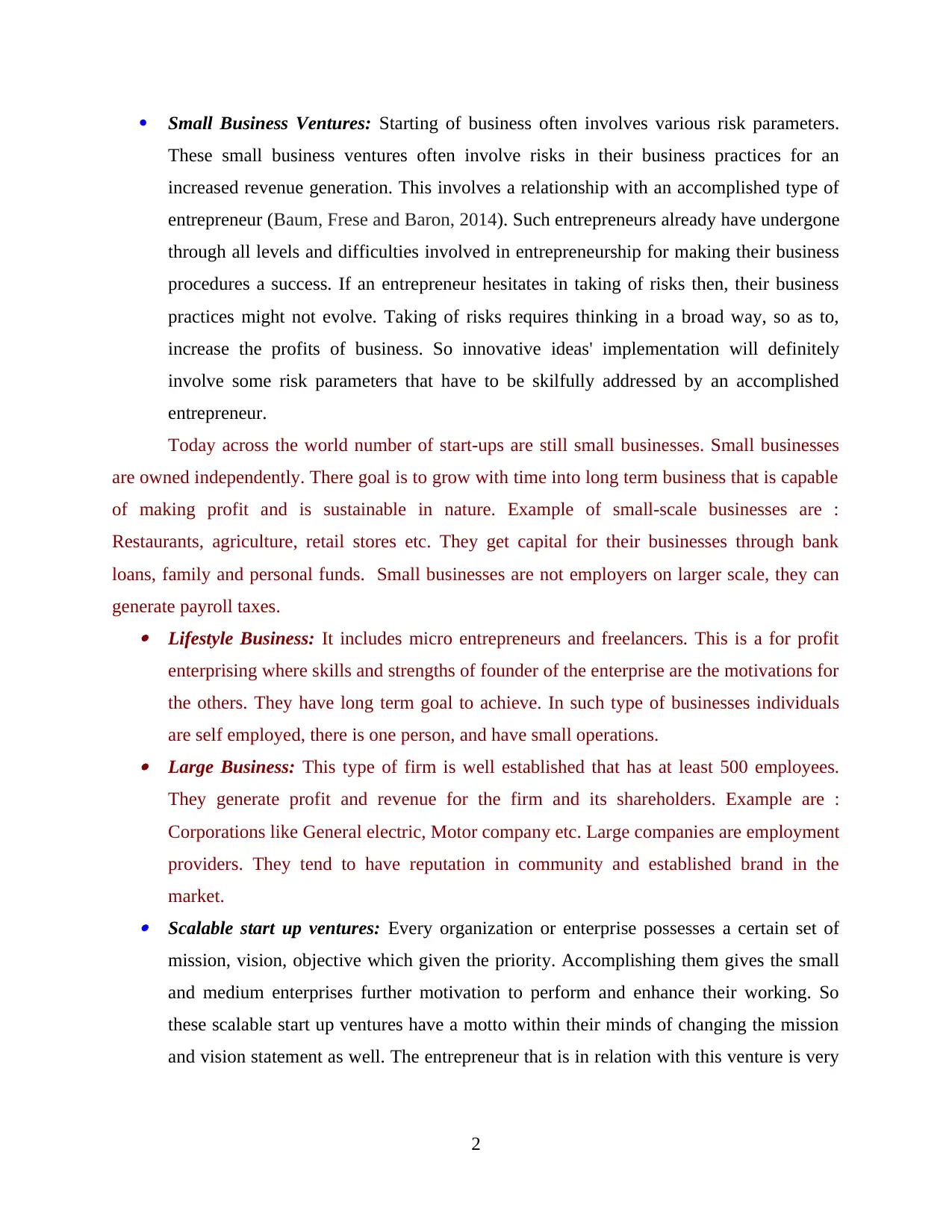
Small Business Ventures: Starting of business often involves various risk parameters.
These small business ventures often involve risks in their business practices for an
increased revenue generation. This involves a relationship with an accomplished type of
entrepreneur (Baum, Frese and Baron, 2014). Such entrepreneurs already have undergone
through all levels and difficulties involved in entrepreneurship for making their business
procedures a success. If an entrepreneur hesitates in taking of risks then, their business
practices might not evolve. Taking of risks requires thinking in a broad way, so as to,
increase the profits of business. So innovative ideas' implementation will definitely
involve some risk parameters that have to be skilfully addressed by an accomplished
entrepreneur.
Today across the world number of start-ups are still small businesses. Small businesses
are owned independently. There goal is to grow with time into long term business that is capable
of making profit and is sustainable in nature. Example of small-scale businesses are :
Restaurants, agriculture, retail stores etc. They get capital for their businesses through bank
loans, family and personal funds. Small businesses are not employers on larger scale, they can
generate payroll taxes. Lifestyle Business: It includes micro entrepreneurs and freelancers. This is a for profit
enterprising where skills and strengths of founder of the enterprise are the motivations for
the others. They have long term goal to achieve. In such type of businesses individuals
are self employed, there is one person, and have small operations. Large Business: This type of firm is well established that has at least 500 employees.
They generate profit and revenue for the firm and its shareholders. Example are :
Corporations like General electric, Motor company etc. Large companies are employment
providers. They tend to have reputation in community and established brand in the
market. Scalable start up ventures: Every organization or enterprise possesses a certain set of
mission, vision, objective which given the priority. Accomplishing them gives the small
and medium enterprises further motivation to perform and enhance their working. So
these scalable start up ventures have a motto within their minds of changing the mission
and vision statement as well. The entrepreneur that is in relation with this venture is very
2
These small business ventures often involve risks in their business practices for an
increased revenue generation. This involves a relationship with an accomplished type of
entrepreneur (Baum, Frese and Baron, 2014). Such entrepreneurs already have undergone
through all levels and difficulties involved in entrepreneurship for making their business
procedures a success. If an entrepreneur hesitates in taking of risks then, their business
practices might not evolve. Taking of risks requires thinking in a broad way, so as to,
increase the profits of business. So innovative ideas' implementation will definitely
involve some risk parameters that have to be skilfully addressed by an accomplished
entrepreneur.
Today across the world number of start-ups are still small businesses. Small businesses
are owned independently. There goal is to grow with time into long term business that is capable
of making profit and is sustainable in nature. Example of small-scale businesses are :
Restaurants, agriculture, retail stores etc. They get capital for their businesses through bank
loans, family and personal funds. Small businesses are not employers on larger scale, they can
generate payroll taxes. Lifestyle Business: It includes micro entrepreneurs and freelancers. This is a for profit
enterprising where skills and strengths of founder of the enterprise are the motivations for
the others. They have long term goal to achieve. In such type of businesses individuals
are self employed, there is one person, and have small operations. Large Business: This type of firm is well established that has at least 500 employees.
They generate profit and revenue for the firm and its shareholders. Example are :
Corporations like General electric, Motor company etc. Large companies are employment
providers. They tend to have reputation in community and established brand in the
market. Scalable start up ventures: Every organization or enterprise possesses a certain set of
mission, vision, objective which given the priority. Accomplishing them gives the small
and medium enterprises further motivation to perform and enhance their working. So
these scalable start up ventures have a motto within their minds of changing the mission
and vision statement as well. The entrepreneur that is in relation with this venture is very
2
Paraphrase This Document
Need a fresh take? Get an instant paraphrase of this document with our AI Paraphraser
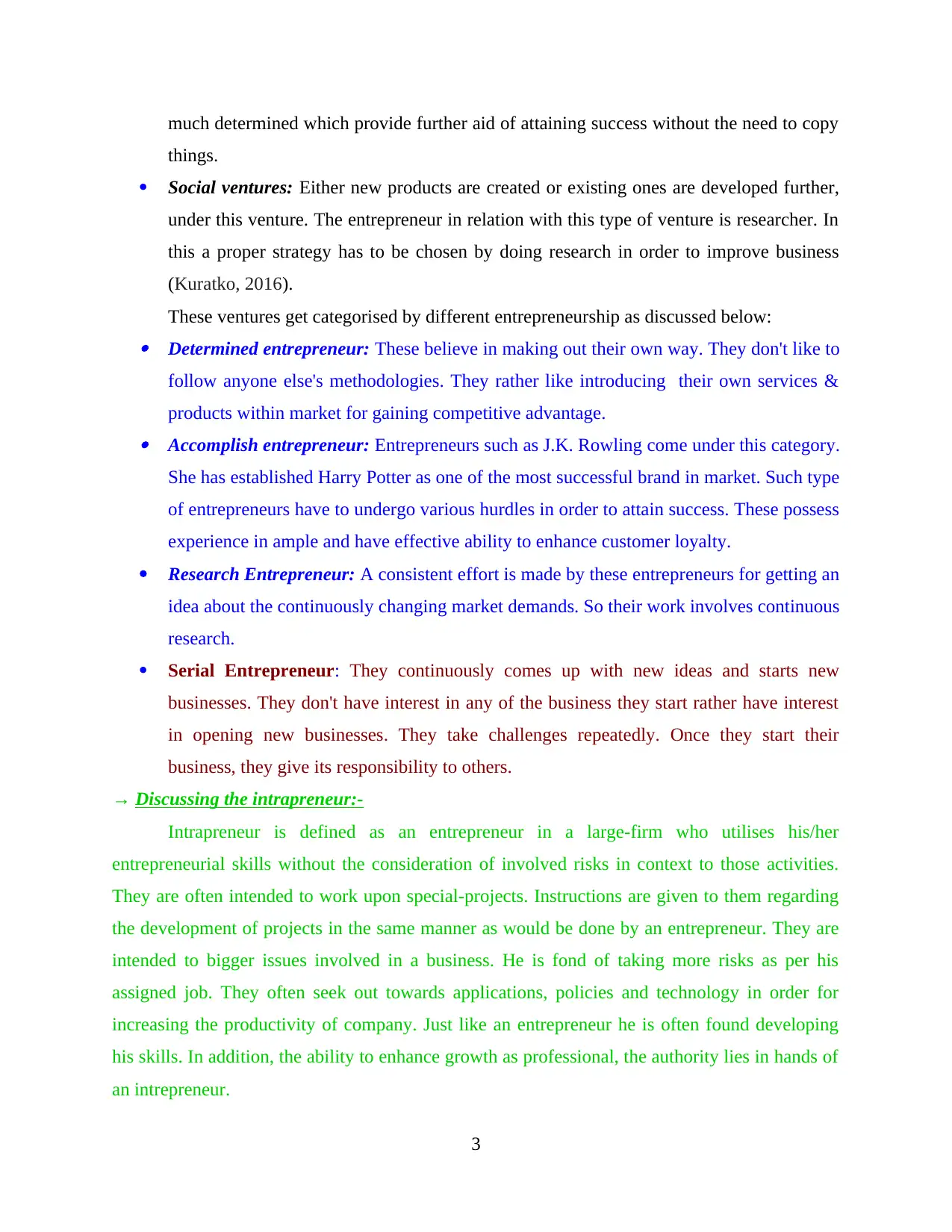
much determined which provide further aid of attaining success without the need to copy
things.
Social ventures: Either new products are created or existing ones are developed further,
under this venture. The entrepreneur in relation with this type of venture is researcher. In
this a proper strategy has to be chosen by doing research in order to improve business
(Kuratko, 2016).
These ventures get categorised by different entrepreneurship as discussed below: Determined entrepreneur: These believe in making out their own way. They don't like to
follow anyone else's methodologies. They rather like introducing their own services &
products within market for gaining competitive advantage. Accomplish entrepreneur: Entrepreneurs such as J.K. Rowling come under this category.
She has established Harry Potter as one of the most successful brand in market. Such type
of entrepreneurs have to undergo various hurdles in order to attain success. These possess
experience in ample and have effective ability to enhance customer loyalty.
Research Entrepreneur: A consistent effort is made by these entrepreneurs for getting an
idea about the continuously changing market demands. So their work involves continuous
research.
Serial Entrepreneur: They continuously comes up with new ideas and starts new
businesses. They don't have interest in any of the business they start rather have interest
in opening new businesses. They take challenges repeatedly. Once they start their
business, they give its responsibility to others.
→ Discussing the intrapreneur:-
Intrapreneur is defined as an entrepreneur in a large-firm who utilises his/her
entrepreneurial skills without the consideration of involved risks in context to those activities.
They are often intended to work upon special-projects. Instructions are given to them regarding
the development of projects in the same manner as would be done by an entrepreneur. They are
intended to bigger issues involved in a business. He is fond of taking more risks as per his
assigned job. They often seek out towards applications, policies and technology in order for
increasing the productivity of company. Just like an entrepreneur he is often found developing
his skills. In addition, the ability to enhance growth as professional, the authority lies in hands of
an intrepreneur.
3
things.
Social ventures: Either new products are created or existing ones are developed further,
under this venture. The entrepreneur in relation with this type of venture is researcher. In
this a proper strategy has to be chosen by doing research in order to improve business
(Kuratko, 2016).
These ventures get categorised by different entrepreneurship as discussed below: Determined entrepreneur: These believe in making out their own way. They don't like to
follow anyone else's methodologies. They rather like introducing their own services &
products within market for gaining competitive advantage. Accomplish entrepreneur: Entrepreneurs such as J.K. Rowling come under this category.
She has established Harry Potter as one of the most successful brand in market. Such type
of entrepreneurs have to undergo various hurdles in order to attain success. These possess
experience in ample and have effective ability to enhance customer loyalty.
Research Entrepreneur: A consistent effort is made by these entrepreneurs for getting an
idea about the continuously changing market demands. So their work involves continuous
research.
Serial Entrepreneur: They continuously comes up with new ideas and starts new
businesses. They don't have interest in any of the business they start rather have interest
in opening new businesses. They take challenges repeatedly. Once they start their
business, they give its responsibility to others.
→ Discussing the intrapreneur:-
Intrapreneur is defined as an entrepreneur in a large-firm who utilises his/her
entrepreneurial skills without the consideration of involved risks in context to those activities.
They are often intended to work upon special-projects. Instructions are given to them regarding
the development of projects in the same manner as would be done by an entrepreneur. They are
intended to bigger issues involved in a business. He is fond of taking more risks as per his
assigned job. They often seek out towards applications, policies and technology in order for
increasing the productivity of company. Just like an entrepreneur he is often found developing
his skills. In addition, the ability to enhance growth as professional, the authority lies in hands of
an intrepreneur.
3
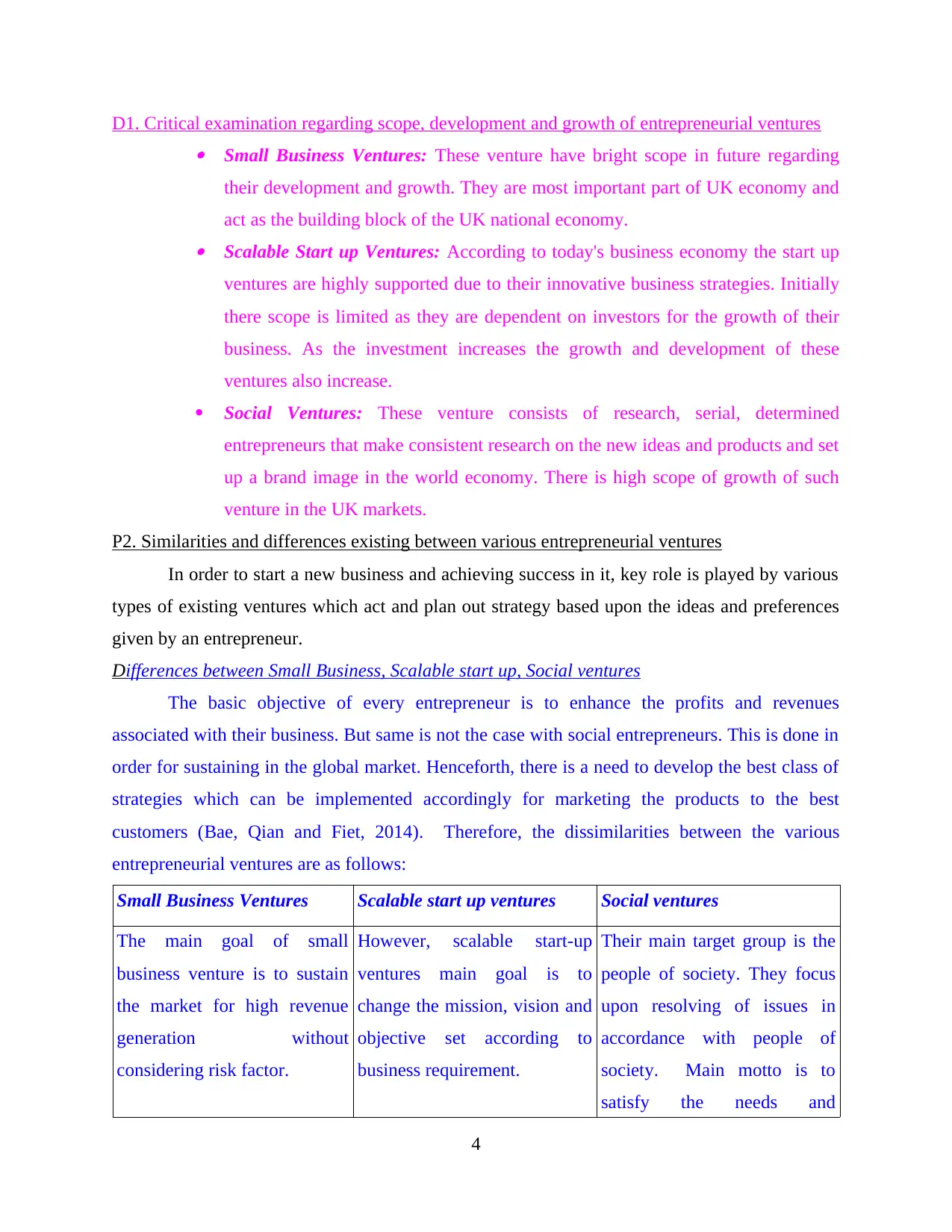
D1. Critical examination regarding scope, development and growth of entrepreneurial ventures
Small Business Ventures: These venture have bright scope in future regarding
their development and growth. They are most important part of UK economy and
act as the building block of the UK national economy.
Scalable Start up Ventures: According to today's business economy the start up
ventures are highly supported due to their innovative business strategies. Initially
there scope is limited as they are dependent on investors for the growth of their
business. As the investment increases the growth and development of these
ventures also increase.
Social Ventures: These venture consists of research, serial, determined
entrepreneurs that make consistent research on the new ideas and products and set
up a brand image in the world economy. There is high scope of growth of such
venture in the UK markets.
P2. Similarities and differences existing between various entrepreneurial ventures
In order to start a new business and achieving success in it, key role is played by various
types of existing ventures which act and plan out strategy based upon the ideas and preferences
given by an entrepreneur.
Differences between Small Business, Scalable start up, Social ventures
The basic objective of every entrepreneur is to enhance the profits and revenues
associated with their business. But same is not the case with social entrepreneurs. This is done in
order for sustaining in the global market. Henceforth, there is a need to develop the best class of
strategies which can be implemented accordingly for marketing the products to the best
customers (Bae, Qian and Fiet, 2014). Therefore, the dissimilarities between the various
entrepreneurial ventures are as follows:
Small Business Ventures Scalable start up ventures Social ventures
The main goal of small
business venture is to sustain
the market for high revenue
generation without
considering risk factor.
However, scalable start-up
ventures main goal is to
change the mission, vision and
objective set according to
business requirement.
Their main target group is the
people of society. They focus
upon resolving of issues in
accordance with people of
society. Main motto is to
satisfy the needs and
4
Small Business Ventures: These venture have bright scope in future regarding
their development and growth. They are most important part of UK economy and
act as the building block of the UK national economy.
Scalable Start up Ventures: According to today's business economy the start up
ventures are highly supported due to their innovative business strategies. Initially
there scope is limited as they are dependent on investors for the growth of their
business. As the investment increases the growth and development of these
ventures also increase.
Social Ventures: These venture consists of research, serial, determined
entrepreneurs that make consistent research on the new ideas and products and set
up a brand image in the world economy. There is high scope of growth of such
venture in the UK markets.
P2. Similarities and differences existing between various entrepreneurial ventures
In order to start a new business and achieving success in it, key role is played by various
types of existing ventures which act and plan out strategy based upon the ideas and preferences
given by an entrepreneur.
Differences between Small Business, Scalable start up, Social ventures
The basic objective of every entrepreneur is to enhance the profits and revenues
associated with their business. But same is not the case with social entrepreneurs. This is done in
order for sustaining in the global market. Henceforth, there is a need to develop the best class of
strategies which can be implemented accordingly for marketing the products to the best
customers (Bae, Qian and Fiet, 2014). Therefore, the dissimilarities between the various
entrepreneurial ventures are as follows:
Small Business Ventures Scalable start up ventures Social ventures
The main goal of small
business venture is to sustain
the market for high revenue
generation without
considering risk factor.
However, scalable start-up
ventures main goal is to
change the mission, vision and
objective set according to
business requirement.
Their main target group is the
people of society. They focus
upon resolving of issues in
accordance with people of
society. Main motto is to
satisfy the needs and
4
⊘ This is a preview!⊘
Do you want full access?
Subscribe today to unlock all pages.

Trusted by 1+ million students worldwide
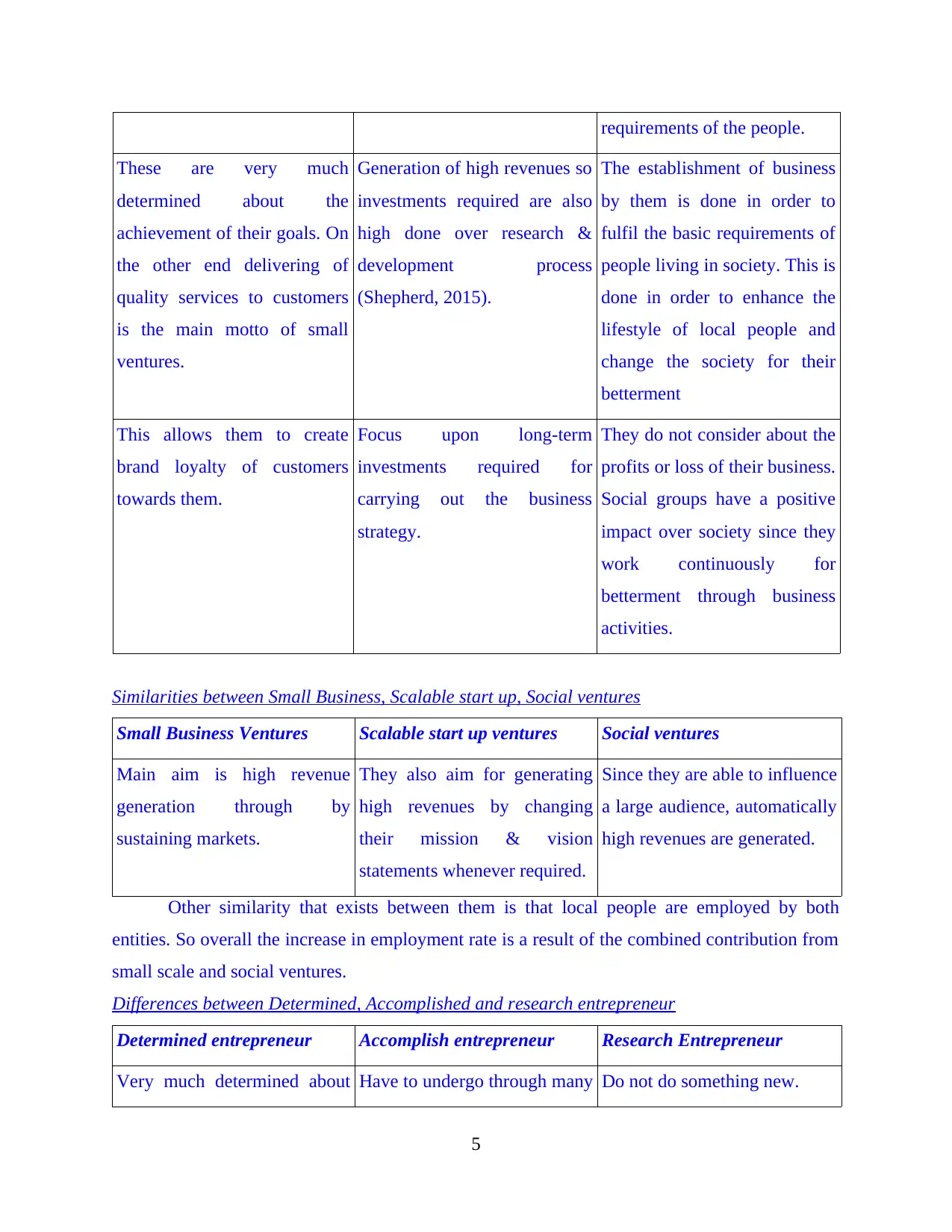
requirements of the people.
These are very much
determined about the
achievement of their goals. On
the other end delivering of
quality services to customers
is the main motto of small
ventures.
Generation of high revenues so
investments required are also
high done over research &
development process
(Shepherd, 2015).
The establishment of business
by them is done in order to
fulfil the basic requirements of
people living in society. This is
done in order to enhance the
lifestyle of local people and
change the society for their
betterment
This allows them to create
brand loyalty of customers
towards them.
Focus upon long-term
investments required for
carrying out the business
strategy.
They do not consider about the
profits or loss of their business.
Social groups have a positive
impact over society since they
work continuously for
betterment through business
activities.
Similarities between Small Business, Scalable start up, Social ventures
Small Business Ventures Scalable start up ventures Social ventures
Main aim is high revenue
generation through by
sustaining markets.
They also aim for generating
high revenues by changing
their mission & vision
statements whenever required.
Since they are able to influence
a large audience, automatically
high revenues are generated.
Other similarity that exists between them is that local people are employed by both
entities. So overall the increase in employment rate is a result of the combined contribution from
small scale and social ventures.
Differences between Determined, Accomplished and research entrepreneur
Determined entrepreneur Accomplish entrepreneur Research Entrepreneur
Very much determined about Have to undergo through many Do not do something new.
5
These are very much
determined about the
achievement of their goals. On
the other end delivering of
quality services to customers
is the main motto of small
ventures.
Generation of high revenues so
investments required are also
high done over research &
development process
(Shepherd, 2015).
The establishment of business
by them is done in order to
fulfil the basic requirements of
people living in society. This is
done in order to enhance the
lifestyle of local people and
change the society for their
betterment
This allows them to create
brand loyalty of customers
towards them.
Focus upon long-term
investments required for
carrying out the business
strategy.
They do not consider about the
profits or loss of their business.
Social groups have a positive
impact over society since they
work continuously for
betterment through business
activities.
Similarities between Small Business, Scalable start up, Social ventures
Small Business Ventures Scalable start up ventures Social ventures
Main aim is high revenue
generation through by
sustaining markets.
They also aim for generating
high revenues by changing
their mission & vision
statements whenever required.
Since they are able to influence
a large audience, automatically
high revenues are generated.
Other similarity that exists between them is that local people are employed by both
entities. So overall the increase in employment rate is a result of the combined contribution from
small scale and social ventures.
Differences between Determined, Accomplished and research entrepreneur
Determined entrepreneur Accomplish entrepreneur Research Entrepreneur
Very much determined about Have to undergo through many Do not do something new.
5
Paraphrase This Document
Need a fresh take? Get an instant paraphrase of this document with our AI Paraphraser
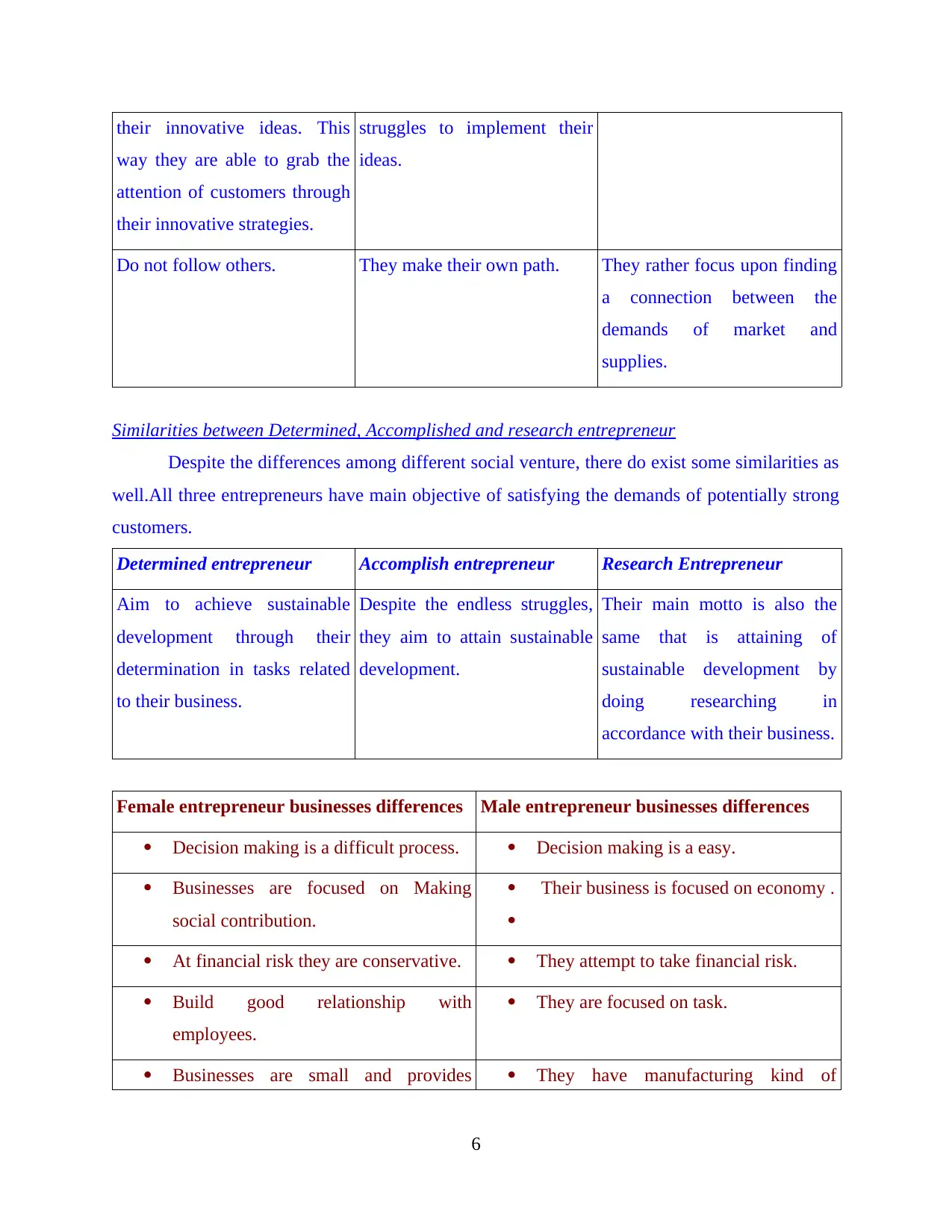
their innovative ideas. This
way they are able to grab the
attention of customers through
their innovative strategies.
struggles to implement their
ideas.
Do not follow others. They make their own path. They rather focus upon finding
a connection between the
demands of market and
supplies.
Similarities between Determined, Accomplished and research entrepreneur
Despite the differences among different social venture, there do exist some similarities as
well.All three entrepreneurs have main objective of satisfying the demands of potentially strong
customers.
Determined entrepreneur Accomplish entrepreneur Research Entrepreneur
Aim to achieve sustainable
development through their
determination in tasks related
to their business.
Despite the endless struggles,
they aim to attain sustainable
development.
Their main motto is also the
same that is attaining of
sustainable development by
doing researching in
accordance with their business.
Female entrepreneur businesses differences Male entrepreneur businesses differences
Decision making is a difficult process. Decision making is a easy.
Businesses are focused on Making
social contribution.
Their business is focused on economy .
At financial risk they are conservative. They attempt to take financial risk.
Build good relationship with
employees.
They are focused on task.
Businesses are small and provides They have manufacturing kind of
6
way they are able to grab the
attention of customers through
their innovative strategies.
struggles to implement their
ideas.
Do not follow others. They make their own path. They rather focus upon finding
a connection between the
demands of market and
supplies.
Similarities between Determined, Accomplished and research entrepreneur
Despite the differences among different social venture, there do exist some similarities as
well.All three entrepreneurs have main objective of satisfying the demands of potentially strong
customers.
Determined entrepreneur Accomplish entrepreneur Research Entrepreneur
Aim to achieve sustainable
development through their
determination in tasks related
to their business.
Despite the endless struggles,
they aim to attain sustainable
development.
Their main motto is also the
same that is attaining of
sustainable development by
doing researching in
accordance with their business.
Female entrepreneur businesses differences Male entrepreneur businesses differences
Decision making is a difficult process. Decision making is a easy.
Businesses are focused on Making
social contribution.
Their business is focused on economy .
At financial risk they are conservative. They attempt to take financial risk.
Build good relationship with
employees.
They are focused on task.
Businesses are small and provides They have manufacturing kind of
6
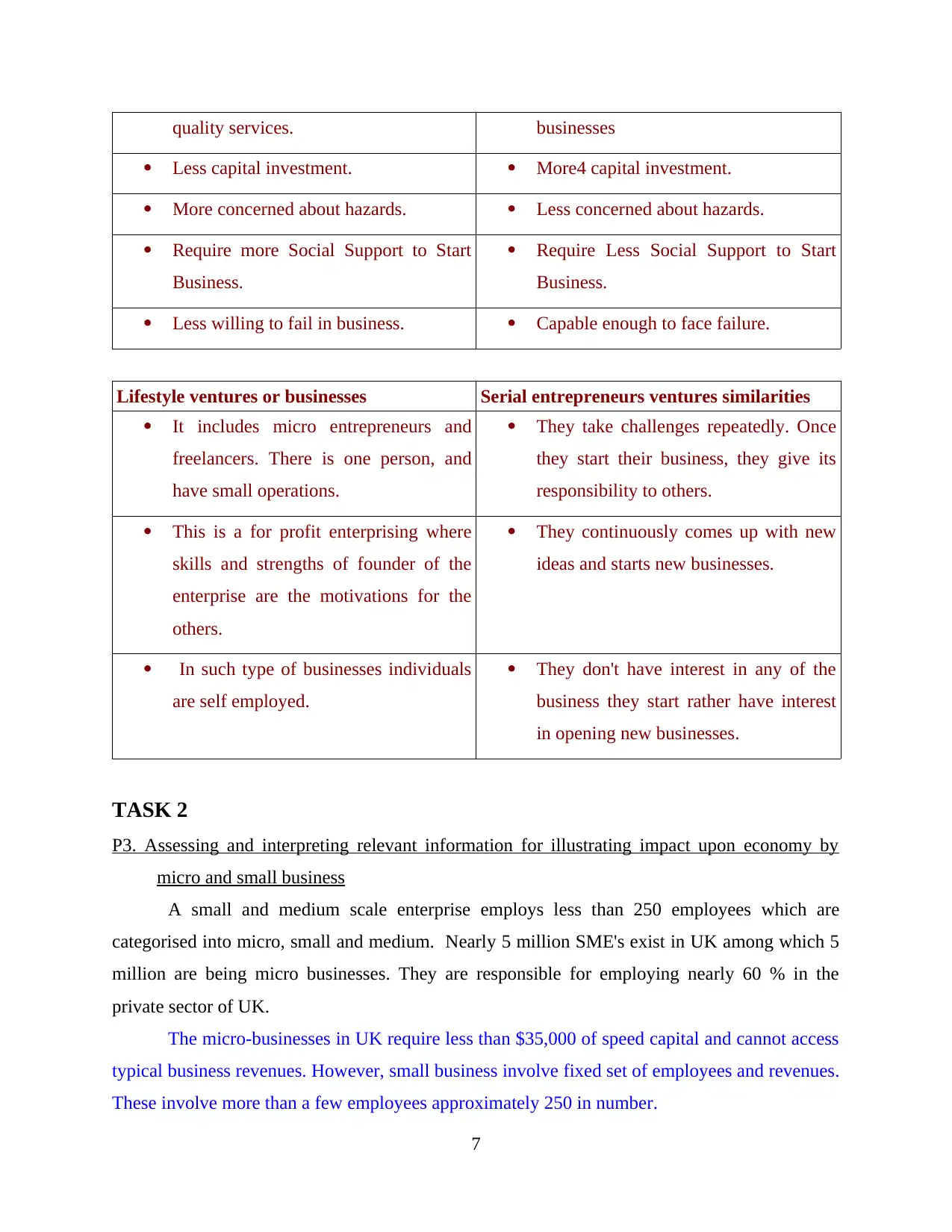
quality services. businesses
Less capital investment. More4 capital investment.
More concerned about hazards. Less concerned about hazards.
Require more Social Support to Start
Business.
Require Less Social Support to Start
Business.
Less willing to fail in business. Capable enough to face failure.
Lifestyle ventures or businesses Serial entrepreneurs ventures similarities
It includes micro entrepreneurs and
freelancers. There is one person, and
have small operations.
They take challenges repeatedly. Once
they start their business, they give its
responsibility to others.
This is a for profit enterprising where
skills and strengths of founder of the
enterprise are the motivations for the
others.
They continuously comes up with new
ideas and starts new businesses.
In such type of businesses individuals
are self employed.
They don't have interest in any of the
business they start rather have interest
in opening new businesses.
TASK 2
P3. Assessing and interpreting relevant information for illustrating impact upon economy by
micro and small business
A small and medium scale enterprise employs less than 250 employees which are
categorised into micro, small and medium. Nearly 5 million SME's exist in UK among which 5
million are being micro businesses. They are responsible for employing nearly 60 % in the
private sector of UK.
The micro-businesses in UK require less than $35,000 of speed capital and cannot access
typical business revenues. However, small business involve fixed set of employees and revenues.
These involve more than a few employees approximately 250 in number.
7
Less capital investment. More4 capital investment.
More concerned about hazards. Less concerned about hazards.
Require more Social Support to Start
Business.
Require Less Social Support to Start
Business.
Less willing to fail in business. Capable enough to face failure.
Lifestyle ventures or businesses Serial entrepreneurs ventures similarities
It includes micro entrepreneurs and
freelancers. There is one person, and
have small operations.
They take challenges repeatedly. Once
they start their business, they give its
responsibility to others.
This is a for profit enterprising where
skills and strengths of founder of the
enterprise are the motivations for the
others.
They continuously comes up with new
ideas and starts new businesses.
In such type of businesses individuals
are self employed.
They don't have interest in any of the
business they start rather have interest
in opening new businesses.
TASK 2
P3. Assessing and interpreting relevant information for illustrating impact upon economy by
micro and small business
A small and medium scale enterprise employs less than 250 employees which are
categorised into micro, small and medium. Nearly 5 million SME's exist in UK among which 5
million are being micro businesses. They are responsible for employing nearly 60 % in the
private sector of UK.
The micro-businesses in UK require less than $35,000 of speed capital and cannot access
typical business revenues. However, small business involve fixed set of employees and revenues.
These involve more than a few employees approximately 250 in number.
7
⊘ This is a preview!⊘
Do you want full access?
Subscribe today to unlock all pages.

Trusted by 1+ million students worldwide
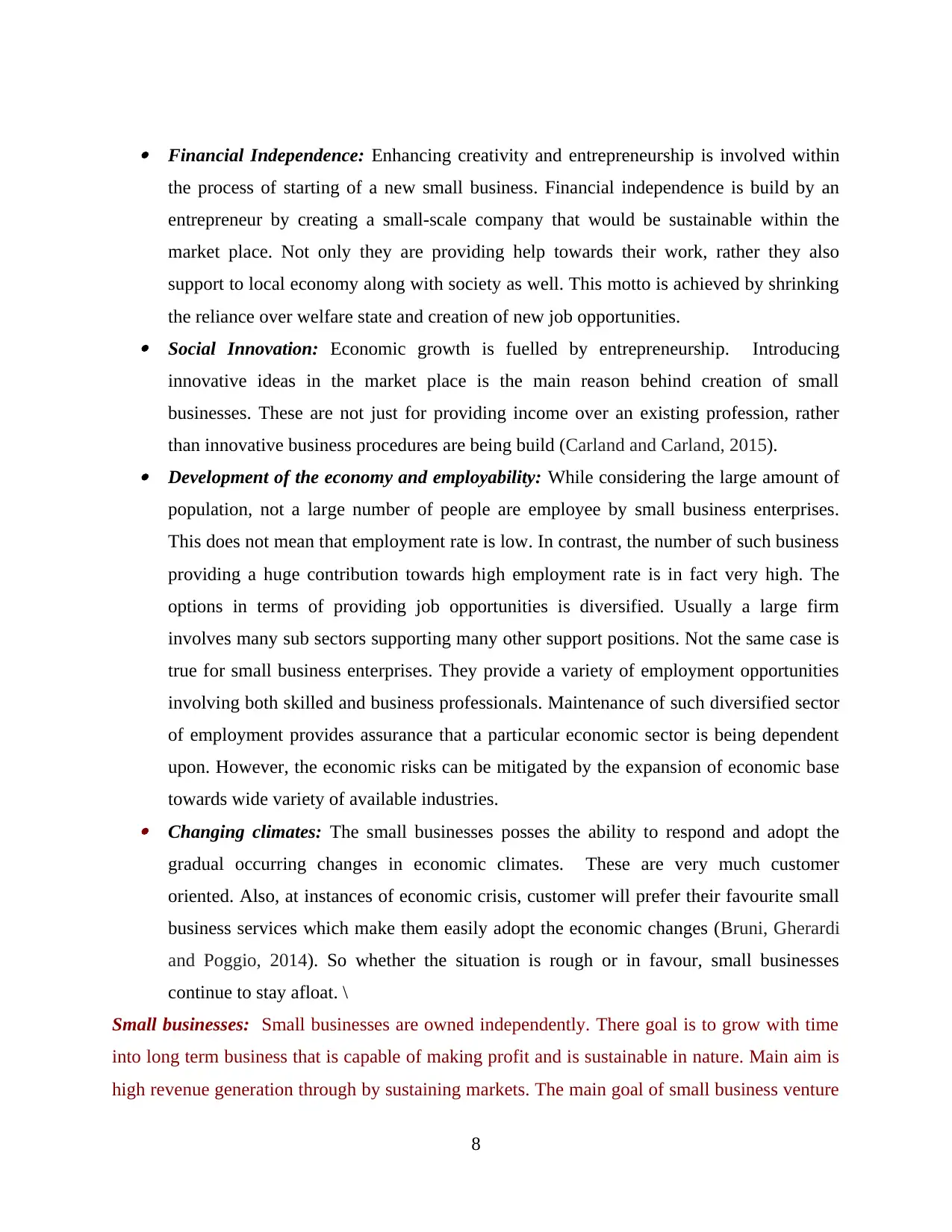
Financial Independence: Enhancing creativity and entrepreneurship is involved within
the process of starting of a new small business. Financial independence is build by an
entrepreneur by creating a small-scale company that would be sustainable within the
market place. Not only they are providing help towards their work, rather they also
support to local economy along with society as well. This motto is achieved by shrinking
the reliance over welfare state and creation of new job opportunities. Social Innovation: Economic growth is fuelled by entrepreneurship. Introducing
innovative ideas in the market place is the main reason behind creation of small
businesses. These are not just for providing income over an existing profession, rather
than innovative business procedures are being build (Carland and Carland, 2015). Development of the economy and employability: While considering the large amount of
population, not a large number of people are employee by small business enterprises.
This does not mean that employment rate is low. In contrast, the number of such business
providing a huge contribution towards high employment rate is in fact very high. The
options in terms of providing job opportunities is diversified. Usually a large firm
involves many sub sectors supporting many other support positions. Not the same case is
true for small business enterprises. They provide a variety of employment opportunities
involving both skilled and business professionals. Maintenance of such diversified sector
of employment provides assurance that a particular economic sector is being dependent
upon. However, the economic risks can be mitigated by the expansion of economic base
towards wide variety of available industries. Changing climates: The small businesses posses the ability to respond and adopt the
gradual occurring changes in economic climates. These are very much customer
oriented. Also, at instances of economic crisis, customer will prefer their favourite small
business services which make them easily adopt the economic changes (Bruni, Gherardi
and Poggio, 2014). So whether the situation is rough or in favour, small businesses
continue to stay afloat. \
Small businesses: Small businesses are owned independently. There goal is to grow with time
into long term business that is capable of making profit and is sustainable in nature. Main aim is
high revenue generation through by sustaining markets. The main goal of small business venture
8
the process of starting of a new small business. Financial independence is build by an
entrepreneur by creating a small-scale company that would be sustainable within the
market place. Not only they are providing help towards their work, rather they also
support to local economy along with society as well. This motto is achieved by shrinking
the reliance over welfare state and creation of new job opportunities. Social Innovation: Economic growth is fuelled by entrepreneurship. Introducing
innovative ideas in the market place is the main reason behind creation of small
businesses. These are not just for providing income over an existing profession, rather
than innovative business procedures are being build (Carland and Carland, 2015). Development of the economy and employability: While considering the large amount of
population, not a large number of people are employee by small business enterprises.
This does not mean that employment rate is low. In contrast, the number of such business
providing a huge contribution towards high employment rate is in fact very high. The
options in terms of providing job opportunities is diversified. Usually a large firm
involves many sub sectors supporting many other support positions. Not the same case is
true for small business enterprises. They provide a variety of employment opportunities
involving both skilled and business professionals. Maintenance of such diversified sector
of employment provides assurance that a particular economic sector is being dependent
upon. However, the economic risks can be mitigated by the expansion of economic base
towards wide variety of available industries. Changing climates: The small businesses posses the ability to respond and adopt the
gradual occurring changes in economic climates. These are very much customer
oriented. Also, at instances of economic crisis, customer will prefer their favourite small
business services which make them easily adopt the economic changes (Bruni, Gherardi
and Poggio, 2014). So whether the situation is rough or in favour, small businesses
continue to stay afloat. \
Small businesses: Small businesses are owned independently. There goal is to grow with time
into long term business that is capable of making profit and is sustainable in nature. Main aim is
high revenue generation through by sustaining markets. The main goal of small business venture
8
Paraphrase This Document
Need a fresh take? Get an instant paraphrase of this document with our AI Paraphraser
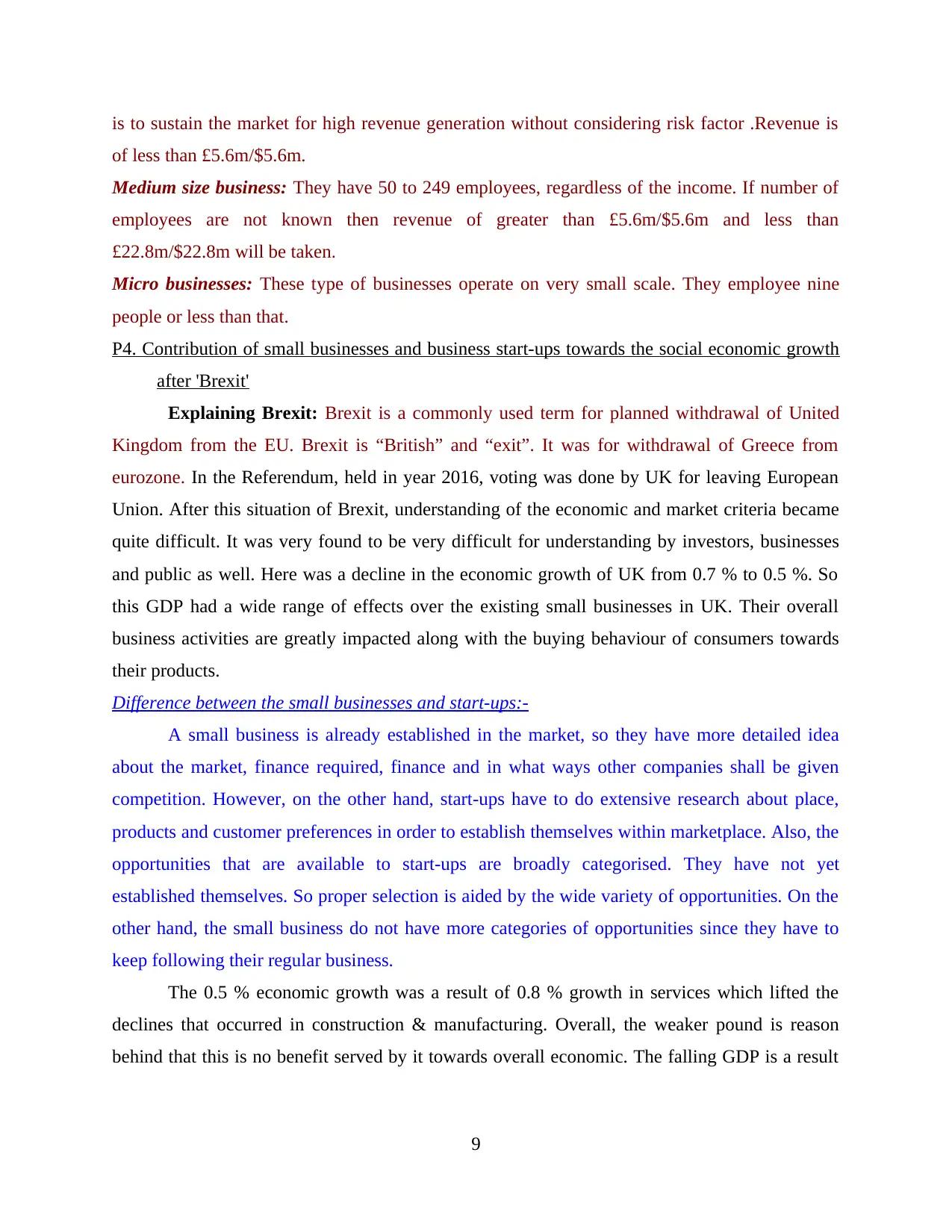
is to sustain the market for high revenue generation without considering risk factor .Revenue is
of less than £5.6m/$5.6m.
Medium size business: They have 50 to 249 employees, regardless of the income. If number of
employees are not known then revenue of greater than £5.6m/$5.6m and less than
£22.8m/$22.8m will be taken.
Micro businesses: These type of businesses operate on very small scale. They employee nine
people or less than that.
P4. Contribution of small businesses and business start-ups towards the social economic growth
after 'Brexit'
Explaining Brexit: Brexit is a commonly used term for planned withdrawal of United
Kingdom from the EU. Brexit is “British” and “exit”. It was for withdrawal of Greece from
eurozone. In the Referendum, held in year 2016, voting was done by UK for leaving European
Union. After this situation of Brexit, understanding of the economic and market criteria became
quite difficult. It was very found to be very difficult for understanding by investors, businesses
and public as well. Here was a decline in the economic growth of UK from 0.7 % to 0.5 %. So
this GDP had a wide range of effects over the existing small businesses in UK. Their overall
business activities are greatly impacted along with the buying behaviour of consumers towards
their products.
Difference between the small businesses and start-ups:-
A small business is already established in the market, so they have more detailed idea
about the market, finance required, finance and in what ways other companies shall be given
competition. However, on the other hand, start-ups have to do extensive research about place,
products and customer preferences in order to establish themselves within marketplace. Also, the
opportunities that are available to start-ups are broadly categorised. They have not yet
established themselves. So proper selection is aided by the wide variety of opportunities. On the
other hand, the small business do not have more categories of opportunities since they have to
keep following their regular business.
The 0.5 % economic growth was a result of 0.8 % growth in services which lifted the
declines that occurred in construction & manufacturing. Overall, the weaker pound is reason
behind that this is no benefit served by it towards overall economic. The falling GDP is a result
9
of less than £5.6m/$5.6m.
Medium size business: They have 50 to 249 employees, regardless of the income. If number of
employees are not known then revenue of greater than £5.6m/$5.6m and less than
£22.8m/$22.8m will be taken.
Micro businesses: These type of businesses operate on very small scale. They employee nine
people or less than that.
P4. Contribution of small businesses and business start-ups towards the social economic growth
after 'Brexit'
Explaining Brexit: Brexit is a commonly used term for planned withdrawal of United
Kingdom from the EU. Brexit is “British” and “exit”. It was for withdrawal of Greece from
eurozone. In the Referendum, held in year 2016, voting was done by UK for leaving European
Union. After this situation of Brexit, understanding of the economic and market criteria became
quite difficult. It was very found to be very difficult for understanding by investors, businesses
and public as well. Here was a decline in the economic growth of UK from 0.7 % to 0.5 %. So
this GDP had a wide range of effects over the existing small businesses in UK. Their overall
business activities are greatly impacted along with the buying behaviour of consumers towards
their products.
Difference between the small businesses and start-ups:-
A small business is already established in the market, so they have more detailed idea
about the market, finance required, finance and in what ways other companies shall be given
competition. However, on the other hand, start-ups have to do extensive research about place,
products and customer preferences in order to establish themselves within marketplace. Also, the
opportunities that are available to start-ups are broadly categorised. They have not yet
established themselves. So proper selection is aided by the wide variety of opportunities. On the
other hand, the small business do not have more categories of opportunities since they have to
keep following their regular business.
The 0.5 % economic growth was a result of 0.8 % growth in services which lifted the
declines that occurred in construction & manufacturing. Overall, the weaker pound is reason
behind that this is no benefit served by it towards overall economic. The falling GDP is a result
9
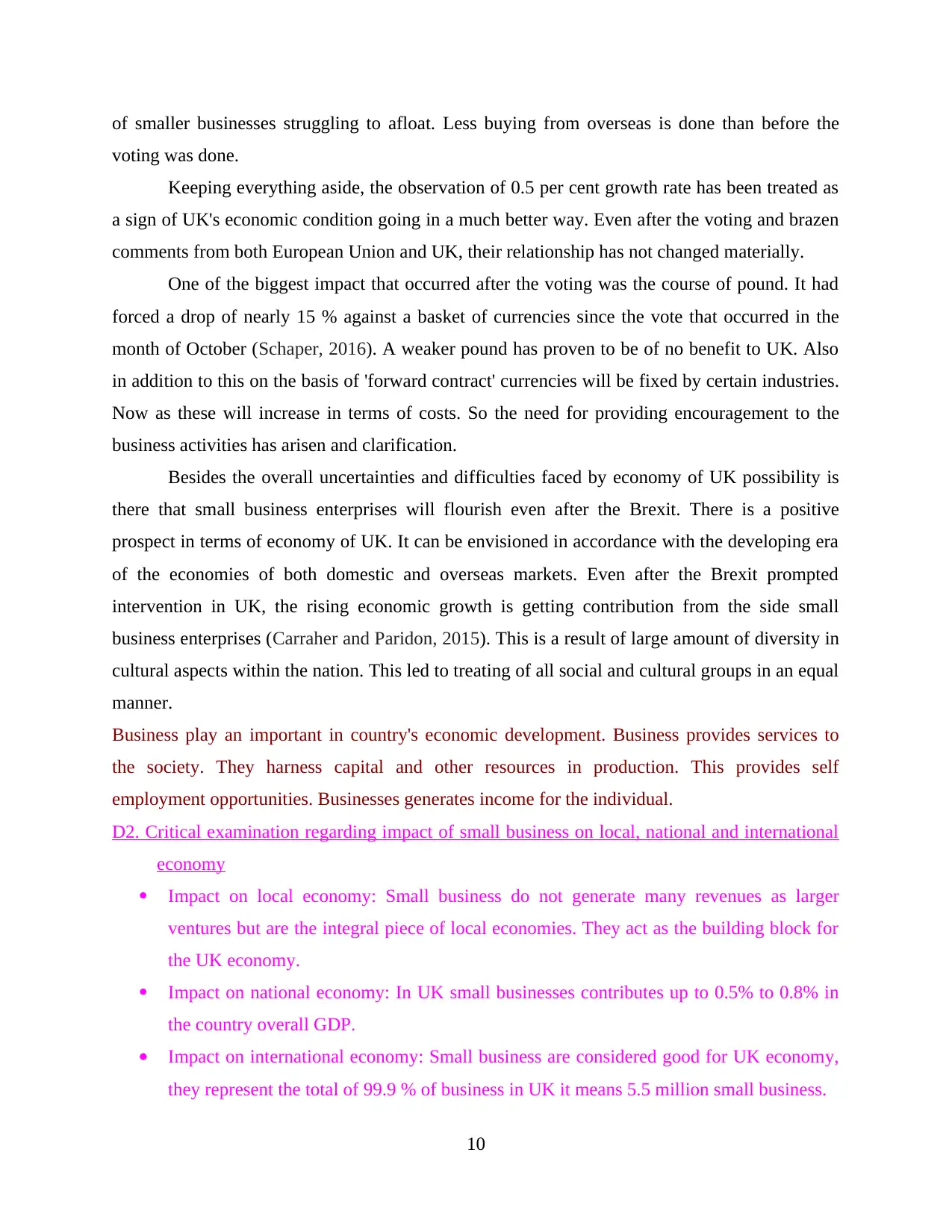
of smaller businesses struggling to afloat. Less buying from overseas is done than before the
voting was done.
Keeping everything aside, the observation of 0.5 per cent growth rate has been treated as
a sign of UK's economic condition going in a much better way. Even after the voting and brazen
comments from both European Union and UK, their relationship has not changed materially.
One of the biggest impact that occurred after the voting was the course of pound. It had
forced a drop of nearly 15 % against a basket of currencies since the vote that occurred in the
month of October (Schaper, 2016). A weaker pound has proven to be of no benefit to UK. Also
in addition to this on the basis of 'forward contract' currencies will be fixed by certain industries.
Now as these will increase in terms of costs. So the need for providing encouragement to the
business activities has arisen and clarification.
Besides the overall uncertainties and difficulties faced by economy of UK possibility is
there that small business enterprises will flourish even after the Brexit. There is a positive
prospect in terms of economy of UK. It can be envisioned in accordance with the developing era
of the economies of both domestic and overseas markets. Even after the Brexit prompted
intervention in UK, the rising economic growth is getting contribution from the side small
business enterprises (Carraher and Paridon, 2015). This is a result of large amount of diversity in
cultural aspects within the nation. This led to treating of all social and cultural groups in an equal
manner.
Business play an important in country's economic development. Business provides services to
the society. They harness capital and other resources in production. This provides self
employment opportunities. Businesses generates income for the individual.
D2. Critical examination regarding impact of small business on local, national and international
economy
Impact on local economy: Small business do not generate many revenues as larger
ventures but are the integral piece of local economies. They act as the building block for
the UK economy.
Impact on national economy: In UK small businesses contributes up to 0.5% to 0.8% in
the country overall GDP.
Impact on international economy: Small business are considered good for UK economy,
they represent the total of 99.9 % of business in UK it means 5.5 million small business.
10
voting was done.
Keeping everything aside, the observation of 0.5 per cent growth rate has been treated as
a sign of UK's economic condition going in a much better way. Even after the voting and brazen
comments from both European Union and UK, their relationship has not changed materially.
One of the biggest impact that occurred after the voting was the course of pound. It had
forced a drop of nearly 15 % against a basket of currencies since the vote that occurred in the
month of October (Schaper, 2016). A weaker pound has proven to be of no benefit to UK. Also
in addition to this on the basis of 'forward contract' currencies will be fixed by certain industries.
Now as these will increase in terms of costs. So the need for providing encouragement to the
business activities has arisen and clarification.
Besides the overall uncertainties and difficulties faced by economy of UK possibility is
there that small business enterprises will flourish even after the Brexit. There is a positive
prospect in terms of economy of UK. It can be envisioned in accordance with the developing era
of the economies of both domestic and overseas markets. Even after the Brexit prompted
intervention in UK, the rising economic growth is getting contribution from the side small
business enterprises (Carraher and Paridon, 2015). This is a result of large amount of diversity in
cultural aspects within the nation. This led to treating of all social and cultural groups in an equal
manner.
Business play an important in country's economic development. Business provides services to
the society. They harness capital and other resources in production. This provides self
employment opportunities. Businesses generates income for the individual.
D2. Critical examination regarding impact of small business on local, national and international
economy
Impact on local economy: Small business do not generate many revenues as larger
ventures but are the integral piece of local economies. They act as the building block for
the UK economy.
Impact on national economy: In UK small businesses contributes up to 0.5% to 0.8% in
the country overall GDP.
Impact on international economy: Small business are considered good for UK economy,
they represent the total of 99.9 % of business in UK it means 5.5 million small business.
10
⊘ This is a preview!⊘
Do you want full access?
Subscribe today to unlock all pages.

Trusted by 1+ million students worldwide
1 out of 19
Related Documents
Your All-in-One AI-Powered Toolkit for Academic Success.
+13062052269
info@desklib.com
Available 24*7 on WhatsApp / Email
![[object Object]](/_next/static/media/star-bottom.7253800d.svg)
Unlock your academic potential
Copyright © 2020–2025 A2Z Services. All Rights Reserved. Developed and managed by ZUCOL.




